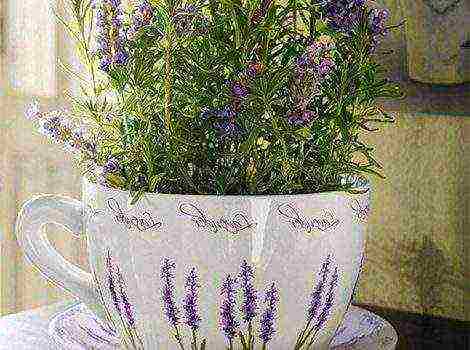Content
- 1 Gladioli. Short description
- 2 How to grow gladioli? General landing rules
- 3 How to grow gladiolus at home? Choosing pots for growing
- 4 Gladioli on the windowsill. Landing rules
- 5 How to grow gladiolus on the balcony. Choosing a flower container
- 6 A flower garden at home. Agricultural technology of cultivation
- 7 Preventive measures
- 8 Planting material. Cleaning and storage
- 9 Reproduction of gladioli
- 10 Planting bulbs in a pot
- 11 Lighting and watering
- 12 How to plant gladioli correctly (video)
- 13 Fertilization
- 14 Gladioli: growing in questions and answers (video)
- 15 Reviews and comments
- 16 Seating gladioli
- 17 Disembarkation and further storage
- 18 Outcome
Lovely flower beds fill the garden with vibrant colors. Flowers are given the most honorable place. Bulbous plants deserve special attention, the magnificence of which is surprisingly combined with the ease of growing.
Gladioli. Short description
The Iris family has many plants of incomparable beauty. A popular member of this family is gladioli, or skewers. The perennial corm has been known for a long time and has a rich history. The natural habitat is the tropics and subtropics of Europe, Asia and Africa. Skaters are distinguished by a variety of shapes. There are tens of thousands of varieties of garden gladioli and at least two hundred natural species.

The graceful long plant has vertical stems. Its height ranges from fifty centimeters to one and a half meters. Rigid leaves, which reach eighty centimeters in length, rush upward like a sharp blade of a sword. Funnel-shaped flowers have different colors and shapes. The spike-shaped inflorescence can be quite dense or loose.
How to grow gladioli? General landing rules
To grow a full-fledged gladiolus, which will delight you with abundant and beautiful flowering, you must follow certain rules of agricultural technology. Skewers are moisture-loving and heat-loving plants. For planting bulbs, site selection is an important consideration. Gladiolus will be strong and healthy in a well-lit area, protected from wind and drafts. In poor light, the plants are very stretched and bloom poorly. The normal development of the flower is ensured by the fertility of the soil. Its most suitable type is black soil or light loamy soil. When planting, complex fertilizers will be useful. They are added to the hole for each plant.
Gladioli are vigorous flowers. The question arises: how to grow gladiolus so that the stem is stable and does not break? The correct planting depth will help keep the plant firmly in the ground. After choosing a site for a flower garden and preparing the soil, the corms ready for planting are sorted by size.
Large corms deepen by ten centimeters, medium - by five to seven. Small bulbs - babies - are planted to a depth of two to three centimeters. The distance between the holes is from five to fifteen centimeters (depending on the size of the planting material).
How to grow gladiolus at home? Choosing pots for growing
Bulbous flowers can be found not only in garden flower beds. Skaters sometimes settle in the most unexpected places. Growing gladioli outdoors is not the only option for planting bulbous flowers. In conditions of artificial soil, they will adorn any interior. But before growing a gladiolus, a number of issues need to be resolved. First of all, you need to choose the right container in which the flowers will grow.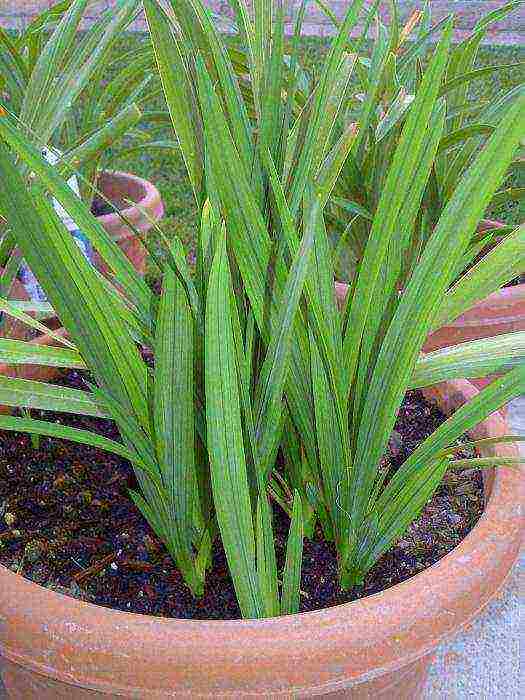 Mistakes will not allow you to get a full-fledged flowering plant. In order to solve the problem of how to grow a gladiolus with a normal developed root system, it is necessary to know the degree of its growth. It branches in the soil to a depth of forty centimeters. Full nutrition of the flower will be able to provide a layer of soil with a thickness of at least forty-five centimeters. Based on this parameter, a suitable growing container is selected. You can use large flower pots or plastic containers, the capacity of which should be at least twelve to fifteen liters.
Mistakes will not allow you to get a full-fledged flowering plant. In order to solve the problem of how to grow a gladiolus with a normal developed root system, it is necessary to know the degree of its growth. It branches in the soil to a depth of forty centimeters. Full nutrition of the flower will be able to provide a layer of soil with a thickness of at least forty-five centimeters. Based on this parameter, a suitable growing container is selected. You can use large flower pots or plastic containers, the capacity of which should be at least twelve to fifteen liters.
Gladioli on the windowsill. Landing rules
An unusual sight - gladioli on the window of a living room. How to grow a gladiolus in a pot so that it is healthy and fully developed and bloomed? At home, small-flowered and miniature varieties of skewers will be more suitable. They have a stem height of thirty to fifty centimeters. The root system of flowers of these varieties is less powerful. It has already been said about the choice of a suitable container. The drainage hole must be present in the pot. Flowers do not tolerate stagnant moisture. Drainage material is poured at the bottom of the tank, which will ensure the normal outflow of water. A good drainage system will ensure normal growing conditions. The pot is filled with soil, which should be quite fertile and at the same time moisture-consuming. The success of growing full-fledged plants depends on its composition. Corms in pots are deepened by eight to twelve centimeters, maintaining a distance between them of six to seven centimeters.
The drainage hole must be present in the pot. Flowers do not tolerate stagnant moisture. Drainage material is poured at the bottom of the tank, which will ensure the normal outflow of water. A good drainage system will ensure normal growing conditions. The pot is filled with soil, which should be quite fertile and at the same time moisture-consuming. The success of growing full-fledged plants depends on its composition. Corms in pots are deepened by eight to twelve centimeters, maintaining a distance between them of six to seven centimeters.
How to grow gladiolus on the balcony. Choosing a flower container
The decoration of balconies and loggias is impossible without flowers. Bulbous plants can be used for this purpose. When choosing varieties, preference is given to gladioli with a small stem height. In order to organize a miniature flower garden, suitable containers are selected. In this case, containers of the required size can be used.

Florists choose according to the same principle that is used when choosing pots for growing gladioli. They must have a volume of at least fifteen liters. Usually, large containers are used on balconies or loggias, in which more plants can be planted than in pots used for indoor growing.
How to grow gladioli from bulbs to ensure proper water balance? Containers must have holes for water outflow. Before filling them with soil mixture, drainage material is laid on the bottom. The soil must be fertile enough. At home, you can use purchased universal light peat soils designed for growing flower crops.
A flower garden at home. Agricultural technology of cultivation
Before growing gladiolus on a window or balcony, you should study the conditions of planting and the content of these flowers. In the open field, gladioli are planted at a soil temperature of at least ten degrees Celsius. In conditions of closed ground, skewers begin to be planted from mid-April.
When choosing a place for placing pots and containers on a windowsill, balcony or loggia, it should be borne in mind that gladioli are heat-loving and light-loving plants. Containers with flowers are placed in well-lit places. Plants do not tolerate drafts and low air temperatures. When growing on a balcony, you need to monitor the temperature. When the temperature drops to ten degrees Celsius, the containers are temporarily brought into the room.
The first shoots appear two or three weeks after planting. During this time, it is important to ensure that the flowers are properly hydrated. Lack of moisture will definitely affect the growth of the plant. It will be weak and lose its decorative shape. Provides moderate watering, avoiding waterlogging. Moisture retention can be ensured by mulching with peat.At the same time, it will serve as an additional plant nutrition. You should also pay attention to air exchange. The soil in the container is constantly loosened, thereby providing air access to the gladiolus root system.
The next important point is feeding gladioli. In indoor conditions, you cannot do without them. How to grow flowers to ensure an adequate diet?  The normal development and flowering of gladioli will require three to four foliar dressings with mineral fertilizers, for the preparation of which the following substances are dissolved in one liter of water:
The normal development and flowering of gladioli will require three to four foliar dressings with mineral fertilizers, for the preparation of which the following substances are dissolved in one liter of water:
- ammonium nitrate - 0.5 g;
- superphosphate - 0.5 g;
- potassium chloride - 0.5 g.
The timing of fertilizing is as follows:
- the first is the appearance of three leaves;
- the second is the appearance of six leaves;
- the third is the beginning of flowering.
Preventive measures
The next part of agrotechnical measures when growing gladioli at home is preventive measures. In indoor conditions, plants develop much weaker than flowers grown in garden flower beds.
How to grow gladioli from bulbs in pots and containers to prevent flower disease? First of all, you should use healthy planting material, which is disinfected for thirty minutes in a solution of potassium permanganate before planting. For its preparation, 0.5 grams of potassium permanganate is enough per liter of water. During the growth period, the condition of the flowers is monitored and the necessary preventive measures are taken.
Planting material. Cleaning and storage
Harvesting gladioli in open ground is carried out in late September and early October. The corm ripens four weeks after flowering stops. In greenhouses, the flowering period lasts a little longer. At the same time, the cleaning time is shifted accordingly. When harvesting, the plants are completely dug out of the ground. After that, they are dried and the stems are cut. 
The bulbs are cleaned of soil and rinsed with water. Then they are kept in a solution of potassium permanganate and then dried well. Next, the old bulbs and root system are removed. The final stage is thorough drying, which will last up to fourteen days.
It is necessary to store gladiolus bulbs in a dry place at a temperature of three to eight degrees Celsius. At home, gladioli can be stored in paper bags or cardboard boxes by placing them on the bottom shelf of the refrigerator.
Reproduction of gladioli
Several methods of reproduction are used - by seeds and small baby bulbs. The latter method is more common. How to grow a gladiolus from children?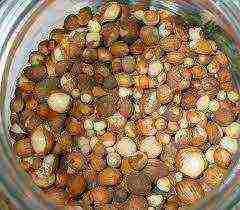
Tuber plants are an excellent material for breeding skewers. Babies are formed on the main bulb. They are small in size. In order to accelerate the flowering of this planting material, in March it is sown in containers. The sowing depth is between two and three centimeters. Baby gladiolus will grow in a container until September. Plant care is the same as for flowers grown from large corms. At the end of the season, the baby grows up to three centimeters in size. In the next season, such corms will become an excellent planting material for full-fledged flowering plants.
These are some of the brightest representatives of our gardens and flower beds. How to grow gladioli? In order for them to grow on your site, too, the cultivation of gladioli in the open field must be carried out in compliance with certain rules. I will tell you about some of the features, nuances of growing this amazing flower.

The plant begins to bloom around mid-July, and by the first day of autumn, a riot of colors, the splendor of the inflorescences reaches its peak. Gladiolus is called the “flower of teachers” for a reason, because it is by September 1 that it becomes especially in demand - every student in a hurry to give a bouquet to his mentor.This, of course, is the practical side of the issue, but it should be noted that the flower itself is a truly luxurious decoration of any garden, suburban area.
What is gladiolus? Another name for the flower is skewer, it belongs to the iris family, even in some way it looks similar to its relatives. It is a corm perennial with about 5,000 varieties. It is worth noting that individual varieties are gradually degenerating, and new hybrids come in their place. Different varieties look different, require a varied approach: colors, size of flowers, structure of inflorescences, peculiarities of growth, nuances of care - everything has its own characteristics and differences.
Photo of gladioli:

↑ back to contents ↑ Secrets of growing gladioli - 11 rules
Let's look at the important nuances of growing this flower, the so-called eleven unshakable rules:
- Crop rotation rule - it is highly discouraged to grow gladiolus flowers in one place for more than two years. In the third year, they need to be moved to a new place of residence.
- When transplanting, it is preferable to choose soil with a different composition. If, for example, your flowers grew on clay soil, it will be better if you transplant them into sandy loam soil.
- Choose “proven” bulb varieties that are adapted to grow in your area. This flower does not like the difference in climatic zones - if you buy a rare variety from Holland, most likely it will be able to please you with flowering only once.
- During planting, small bulbs are planted first, and then large ones. There is no need to place adults and children 's bulbs next to them - large tubers will suppress the "children". Especially large specimens are generally best planted separately.
- Growing gladioli - it is extremely important here to properly deepen the tuber. Look at its diameter, if the soil is light at the planting site, then the "immersion" depth should be about four diameters. If the soil is heavy, then a depth of three diameters will be sufficient. If planting is not deep enough, the plant will have to provide additional support, and if it is too deep, it may not bloom at all.
- About five days before planting, it is recommended to clean the tubers from coarse husks (for better germination), after planting, water them once every two days.
- Gladioli are light-loving plants, if you choose a late-flowering variety, then do not plant it in shaded areas. Shade is only suitable for early varieties, but even they can be late blooming.
- To exclude the occurrence of fungal manifestations, plant the skewer in a ventilated place if possible.
- If the flowers grow in sandy loam soil, it is recommended to apply top dressing by irrigating the ground part of the plant (leaves).
- With the onset of summer, gladioli need to be watered once every 5-7 days, but at the same time, moisture saturation should be abundant. If it's hot, then in order to avoid overheating the soil, water the flowers moderately daily (after sunset), while do not forget to loosen the ground and destroy the weeds.
- Pay special attention to the collection of tubers, the subsequent storage of gladioli in winter should be carried out correctly.
It is very important to choose a comfortable place for planting so that the flower can fully grow and bloom. Gladiolus does not like waterlogged soil, so it cannot be planted in places with a high groundwater table. This rule also applies to low-lying areas, areas where water can stagnate.
↑ back to contents ↑ When to dig up gladioli and how to store it?
After the skewer has completely bloomed (this happens by mid-late September), its upper part is cut off at the root, and the tuber is carefully removed from the ground. For the convenience of the process, the flower can be pre-watered.The bulb is cleared of the ground, thoroughly dried, the tubers of the early varieties are dug out first, and young and medium-sized bulbs are extracted from the ground last.


To prevent the growth of bacteria during storage, the tubers can be pickled in a hot solution of potassium permanganate (about + 60 ° C); for these purposes, the "Fitosporin", "Maxima" agent is also suitable. After 20-25 minutes, the tubers are taken out of the hot bath, dried for about two weeks in a dry and cool place, then wrapped in paper, removed to a cold environment.
Bulbs, photo:


How to store gladioli in the winter at home? For these purposes, a cellar or refrigerator (compartment for storing vegetables) is suitable. In winter, once a month, do not be lazy to take out the bulbs, inspect them, ventilate them. You can put several peeled garlic cloves in a container with tubers - this will create additional protection against diseases during storage. The teeth should be periodically replaced with fresh ones. With the onset of spring, the bulbs can be planted back into the soil, giving new life to a new generation of flowers. Remember that the pot life is limited to 4 years. Do not take too large old bulbs for storage - this is a waste material that is no longer suitable for planting. Small young bulbs will not give a lush flowering, this should also be taken into account.
When to get gladioli from the refrigerator for germination? The best time to awaken the bulbs from their winter sleep is 25-30 days before planting. Carefully inspect each tuber for rot, parasites, or any damage. Excess husks must be removed, if there is slight damage, cut off, after which it is necessary to etch the planting material again as described above (potassium permanganate, "Maxima", "Fitosporin", "Karbofos"). Places of cuts can be covered with ordinary brilliant green. A dry and light, but not sunny place is perfect for sprouting bulbs, but they need to be laid out on clean paper with the bottom down. 48 hours before planting the bulbs, it is recommended to find an area illuminated by the sun and spread them on a damp cloth (moisten it as it dries) - this way, you will stimulate the growth of root buds.
Bulbs ready for planting, photo:

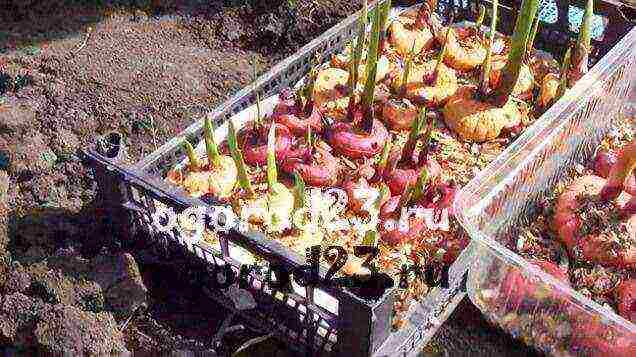
↑ back to contents ↑ How to plant gladioli in the spring
Initially, choose a place for the future flower garden. Skater prefers flat, well-lit areas, ventilated, but not very windy. As mentioned above, early varieties can be planted even in the shade; only sunny areas are suitable for representatives of late varieties. It is very important what vegetables or flowers grew in this place earlier - tomatoes, beans, peas, strawberries, marigolds are quite suitable for the company of a skewer. If carrots, potatoes, cabbage and other vegetables previously grown on the site, for feeding which manure is used, then it is highly not recommended to plant gladioli there. Loamy, sandy loam, slightly acidic soil is the best environment for a skewer.
Gladioli are quite capricious. Planting tubers in too acidic soil will negatively affect flowering, and the risk of Fusarium disease will increase significantly. Alkaline soil will prevent the plant from consuming the required amount of iron from the ground - the leaf will turn yellow (the production of chlorophyll will decrease). The acceptable level of soil acidity for skewers is pH 6.5-6.7. The soil can be independently "diluted" with clay if it is sandy and vice versa. In autumn, a pre-selected place is thoroughly dug up, dry potash or phosphorus additives are introduced, as well as rotted compost.
Planting gladioli in the ground in the spring is carried out when the ground warms up to +10 ° C, by mid-April / early May. Before planting, you can once again pickle the tubers in a phytosporin solution (about 30 minutes).The depth of the trench is affected by the size of the bulb (the larger, the deeper), the skewer is planted in groups, adults and young bulbs are planted separately. It is recommended to sprinkle the bottom of the trench with sand, spill it with water, place the tubers at a distance of about 9-15 cm from one another. Instead of sand, you can use sphagnum, it will retain water better and partially stops the development of fungi.
Eleven planting rules for gladioli indicate the subtleties of burying tubers into the soil. After planting, the trench is covered with earth, you can also pre-sprinkle the bulbs with wood ash. Sometimes gardeners recommend not filling the tubers completely, but doing this as the flower grows. But I would not recommend doing that. It is possible that you will forget to add soil in time. And heavy rain or excessive watering will contribute to the fact that the germinated bulb in soft soil will lose its support, bend at an angle to the soil surface. It will no longer be possible to straighten, give the shoot a vertical position without fear of breaking off the shoot at the base of the bulb - you will lose the flower, a new shoot is unlikely to grow.
Planting bulbs, photo:

 Planting bulbs in rows
Planting bulbs in rows Planting bulbs in meadows
Planting bulbs in meadows
Gladioli - when to plant them and how, we have already figured out, now we will take a closer look at the care itself. The first days of the garden bed should be watered every other day; in case of drought, it is recommended to provide plants with daily evening watering, and irrigation of the leaves will not interfere with gladioli. If it rains periodically, then watering every 4 days will be appropriate. Do not pour water into the plant trench, only water the aisle! Thus, the water will optimally moisten the soil in the root area without oversaturation.
When the sprouts of the skewer reach 10 cm, mulch the soil with humus - it will additionally protect the plant from overheating and evaporation of moisture. Mineral and organic fertilizing is essential for harmonious development and flowering. When the first 2 leaves appear on the sprouts, you can begin to add carbamide or ammonium sulfate to the soil (nitrogen-sulfur dressing). If there are 6 leaves, you can start adding potash or phosphorus supplements, as well as a little nitrogenous. When buds are forming on the skewer, it is recommended to add phosphorus-potassium supplements - they complete the fertilization cycle.
Gladioli, photo of flowers:

Organic fertilizing is applied during watering along with water (flowers also need to be watered before and after they are applied). For example, poultry droppings should be pre-infused for about 10 days (2 buckets to 4 buckets of water). This solution is diluted with water (1 liter per 10 liters of water) and the plants are fertilized every 2-3 weeks. You should be aware that animal manure should never be used to feed gladioli!
For skewer grown in sandy loam soil, foliar fertilization is especially recommended. Thus, the leaves can be irrigated with a weak solution of boric acid, potassium permanganate or copper sulfate. To these compositions, you can add a small part of the laundry soap, grated on a fine grater. Spraying is carried out about 2-3 times throughout the season, especially during the growth of the flower and during the budding period. Loosening of the soil and weeding should be carried out after watering, because gladiolus loves oxygen, which is actively supplied to the roots after this procedure. Weeding is done once every 7-10 days, as needed.
Some varieties of skewer can reach 170 cm; to prevent the stem from breaking, it is better to secure such tall plants by tying them to a peg. You can also stretch several rows of wire or fishing line around the flower bed if there are a lot of plants. When cutting flowers, you need to leave part of the stem above ground level, at least 4 leaves should remain on it. Gladiolus is a so-called bouquet culture, so that the flower stays longer after being cut, it should be cut at the stage of blooming of the first 3 or 4 buds.The varieties that show the world 8-10 flowers on a long stem look especially luxurious. If possible, cut off gladioli early in the morning or after sunset, leaving any remaining buds hidden in the foliage.
Gladioli, photo:

↑ back to content ↑ Diseases of gladioli, photos, treatment
To prevent the development of the disease at the root, do not be lazy to make regular inspection of both tubers and flowers growing on the site.
The most dangerous diseases of the skewer are botrytis (gray rot), fusarium, rust, septoria, sclerotinia, scab.


Avoid waterlogging of the root system of plants, carefully inspect them, pay due attention to preventive measures. Preparations "Horus", "Fundazol", "Kadris" give good results when processing gladiolus before the onset of the flowering phase. It is also recommended to treat tubers with fundazole after removing from the ground and before winter storage.
Malignant thrips, bulbous mites, cabbage scoops and slugs love to nest on a skewer and feed on its juices.
Photo of gladioli affected by thrips:



Preparations "Confidorm Maxi", insecticide "Aktara", "Calypso", anti-tick agent "Agrovertin", biological agent "Aktofit", "Balazo" give high performance in the fight against pests.
Like any other beautiful garden representative, this flower requires attention. But gladiolus will definitely reward us with the beauty and lush color of summer colors. Growing in the open field is fraught with some conventions, but it fully justifies the invested effort and time.



 Many gardeners dream of growing gladioli in pots, but not everyone knows that even an inexperienced florist is quite capable of growing these flowers indoors, if you adhere to simple rules.
Many gardeners dream of growing gladioli in pots, but not everyone knows that even an inexperienced florist is quite capable of growing these flowers indoors, if you adhere to simple rules.
Planting bulbs in a pot
For growing at home, it is best to give preference to undersized varieties, the maximum height of which can reach 50 cm. After all, growing large gladioli at home is problematic. They may simply not reach their maximum size, and the flowers will not be as large as they should be.
Before planting the bulbs, prepare the correct container for the gladiolus. It is best to use a pot that is wide and not too tall. In it, the root system of the flower will feel normal. To plant several gladiolus bulbs, choose a pot with a volume of about 15 liters and a height of about 50 cm.
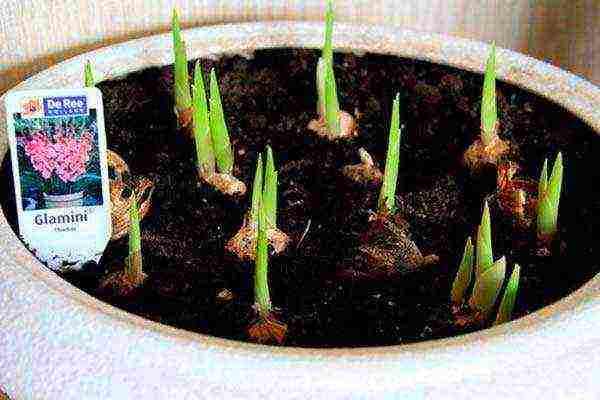
The container must be thoroughly washed with hot water with laundry or green soap and then rinsed. It is advisable to rinse the pot with a weak solution of potassium permanganate, which will provide additional disinfection. At the bottom, be sure to make several drainage holes to drain off excess water.
It is best to use medium-sized expanded clay pebbles as drainage. The drainage layer should be at least 5 cm. This applies to both large containers for several bulbs and small pots in which it is planned to grow one flower at a time. Bulbs do not tolerate excess moisture in the soil.
Also read: Note to summer residents: what can be planted after and with potatoes
Gladioli will grow well and bloom profusely only in loose, moisture-consuming soil. Therefore, you need to choose a universal substrate before planting the bulbs in the soil. The main thing is that the earth is sufficiently nutritious. Before planting, no additional fertilizer should be applied to it. Only a small amount of sand can be added. Also, do not forget to moisten the soil with a spray bottle before planting the bulbs so that they can gain a foothold in it.
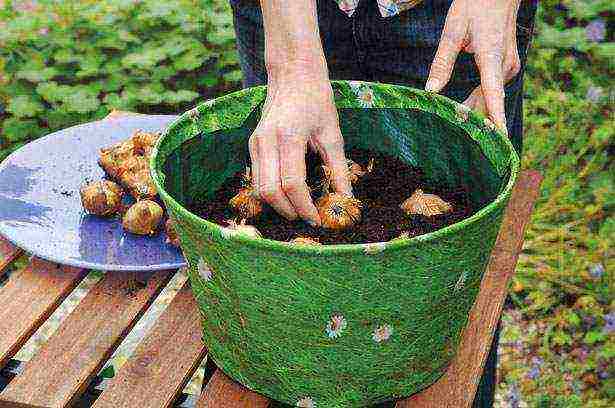
Planting the bulbs in the ground should be about 10-15 cm, depending on the size. If several bulbs are planted in one container at once, then it is important to maintain the optimal distance between them of 10 cm. So the flowers in the future will not interfere with each other's growth, and the flowers will be larger.You don't have to tamp the soil hard on top of the bulbs. It is enough just to sprinkle it on top, and then moisten the soil again from the spray bottle. Planting gladioli in pots should be in early April.
Lighting and watering
As for the features of the subsequent care of these flowers, it is extremely important to maintain a normal level of moisture in the pot. These flowers simultaneously need moistened soil, but they simply cannot stand waterlogging of the earth. It can kill the bulb in a few days. Especially if she is still very young.
Immediately after planting the bulb in the pot, the soil should not be watered until the first green shoots appear. But then it will already be possible to look at the state of the soil in the pot. If it's dry, you need to moisten it. It is best to water the gladioli through a pallet, since then the likelihood that the bulb will start to rot from waterlogging will be much lower. But even from above, the ground will need to be slightly moistened from a spray bottle so that it can be easily loosened for oxygen access.
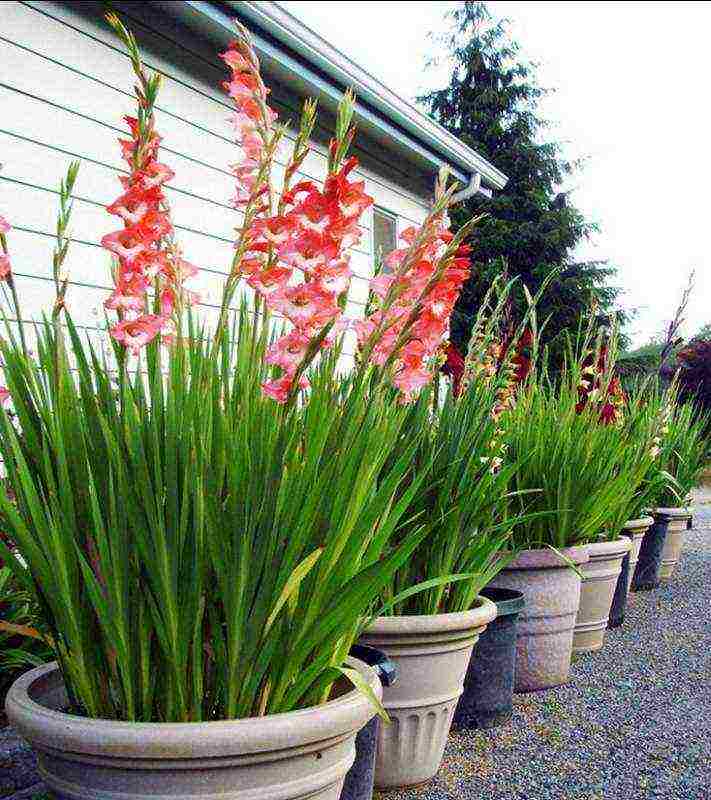
Experts advise watering gladioli less often, but at the same time try to maintain constant moisture in the soil. A good option in this situation would be to mulch the ground with peat, which will simultaneously disinfect the ground and prevent it from drying out with a lack of moisture.
Lighting is essential for growing gladioli in pots. These flowers are very fond of sunlight, even when it comes to direct sunlight. In spring, autumn and winter, in a house or apartment, it is necessary to arrange additional lighting for plants in the morning and in the evening. It is best if they are fluorescent lamps. After all, ordinary light bulbs do not fully compensate gladioli for the lack of natural sunlight.
How to plant gladioli correctly (video)
Fertilization
In order for gladioli to bloom for a very long time, and the flowers are bright and large, they should be periodically fed. But even here it is necessary to observe the measure. After all, both a lack and an excess of nutrients in the soil can negatively affect the development of these plants.

The first feeding should be done when the first 3 leaves are formed. It is recommended to feed gladioli a second time after the appearance of the sixth or seventh leaf. And the third time, it is imperative to fertilize the soil at the very beginning of flowering, when the plant is just beginning to release buds.
It is best to use mineral fertilizers for dressing. But when the bulb releases several leaves, it will be possible to alternate mineral fertilizers with organic fertilizers without fear. Sometimes even such feeding does not work, but the plant still develops very slowly. Then you need to use growth stimulants that are sold in every flower shop. Growth stimulants should be applied both directly to the soil and foliar dressing should be carried out with them, spraying the leaves, but trying not to get on the bulb. Then it will be possible to grow a large and beautiful gladiolus in a short time.
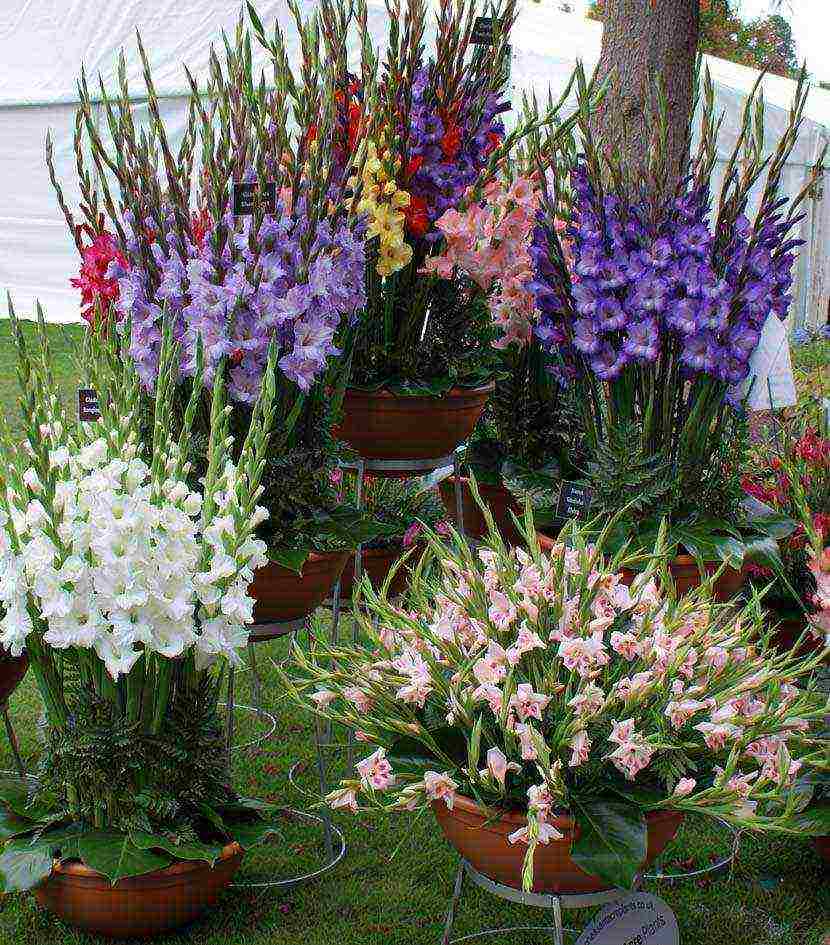
Growing gladiolus at home is a snap.
If you do everything correctly and observe the measure in everything, then you can get a beautiful, even flower. Indoor gladioli practically do not differ from the same colors of open ground. Unless their size is slightly smaller and the rate of development is not so fast. After all, flowers in the house always lack the main thing - the constant availability of fresh air.
Gladioli: growing in questions and answers (video)
Reviews and comments
Did you find a mistake in the text? Please select it and press Ctrl + Enter. Thank you!
Rating:
Rednasty
0 0
Since gladiolus is a majestic and beautiful flower with a massive root system, it needs not only special care, but also a lot of space to grow. Many summer residents are convinced that such a culture should be planted only in garden plots.I do not quite agree with them, and I will tell you whether it is possible to grow gladioli on the balcony, and how to provide the plant with full and proper care.

If you still do not know how to grow lush gladioli on a loggia or balcony, then this article is for you.
Seating gladioli
Thanks to resourceful breeders, today there are many miniature or small-flowered varieties of gladiolus, which will not be problematic to grow on the balcony. After spending a little time, you will receive a luxurious decoration for your apartment, which will delight the eye for a long time.
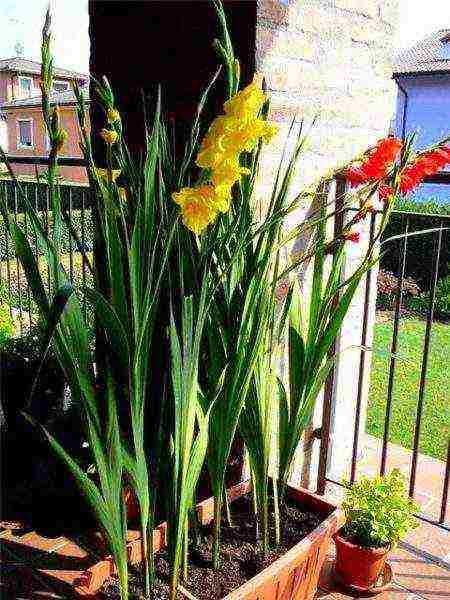
Tall bright flowers can decorate any balcony
Below I will tell you about the main stages of preparing and planting such a wonderful plant at home.
Stage 1. Selection of bulbs
Needless to say, bulbs selection is one of the most important planting steps? By treating this process with insufficient responsibility, you run the risk of getting weak flowering, or even being left without it. I will describe the main points to pay attention to during the preparation process.

The decorative properties of the flower will directly depend on the quality of the bulbs.
- Examine the bulbs carefully. This should be done about 3 weeks before disembarkation (gladioli are planted most often in April). Peel each bulb and examine it.
Existing spots may indicate fusarium or bacterial scab.... This problem is easily fixable. Cut out all the damaged areas with a sharp knife, grease them with brilliant green and let the bulb dry.
If the degree of damage is critical, it is better to discard such planting material.

Keep the bulbs laid out in one layer on a flat surface for several weeks.
- In a flat container, arrange the onions in one row and leave them at room temperature for 18 days. Due to the fact that before buying the bulbs were stored in a cool place, due to this technique, you will give them as if "to come to life".
- After the allotted period, dilute potassium permanganate or foundationol in water (the instructions for the preparation contain an indication of the required dosage). In a solution of foundation, the bulbs should be soaked for 20 minutes, in a potassium permanganate solution - for 30.
- Put a layer of cotton wool in an almost flat container, moisten it with water. Place the bulbs on it with the bottom down and leave them for three days.

After pretreatment, the bulbs are ready for planting.
After such manipulations, roots appear on the bottom, which means that gladioli are ready to plant in the ground.
Stage 2. Landing
After the bulbs are completely ready for planting, you need to take care of good capacity and filling in it. To do this, you will need:
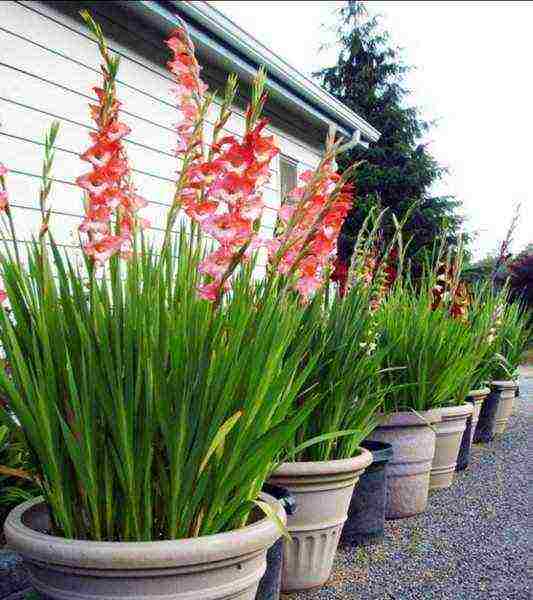
Pots for gladioli should be large and roomy.
- Purchase a large enough pot, 30-40 cm deep and about the same diameter. Remember, the larger the container, the better.
- Gladioli do not belong to flowers that are overly moisture-loving, and therefore it is worth taking care of the drainage holes that are responsible for the outflow of excess water... I recommend using broken shards for this purpose, which are placed on the bottom of the planting tank.

Spare no fertilizer for the soil
- Pour the nutrient substrate over the drain.
- To plant gladioli with your own hands was successful, use moisture-absorbing, structural soil. Fertile soil will be an excellent helper and will provide beautiful flowering.
- Make small depressions in the soil with a narrow spatula, pour warm water into it. Place the bulbs there and dust them with earth.
Place the pot with gladioli on the brightest place on the balcony or loggia. On hot days, open windows to keep flowers from overheating. Fresh air is good, but watch out for drafts, they have a detrimental effect on the plant.
Stage 3. Plant care
As I said earlier, gladioli planted in pots require a particularly careful attitude towards themselves. Read about the nuances of caring for these wonderful flowers below:
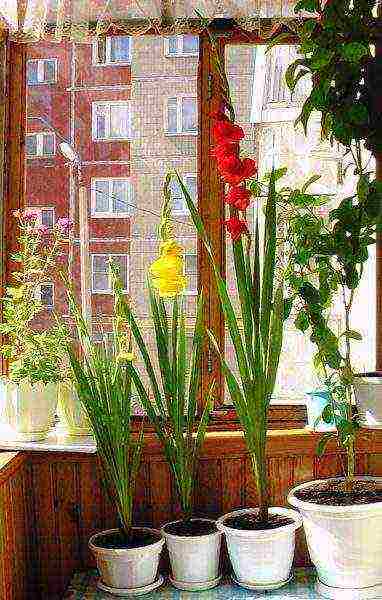
In order for the plant to delight you with lush flowering, do not be lazy to carefully care for it.
- When feeding the flowers with moisture, do not forget that from an excess of water, the peduncle can bend, stop growing, from which it will lose its decorative qualities... Water the plant frequently, but in moderation. On hot summer days, you can moisten the soil at least 3 times a week.
- Fertilize the soil periodically using peat or humus.
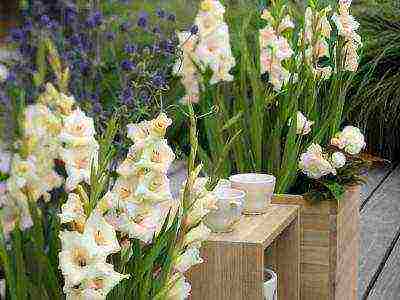
With good fertilization and proper care, gladioli will look amazing.
- Use organic and mineral supplements, alternating between them. The “feeding” scheme may look like this: carry out the first feeding at the stage of appearance of the 3rd leaf, the second - after the formation of the 6th leaf, and the third and fourth - during and after the formation of inflorescences.
- Treat loose or dull flowers with a growth stimulant. I recommend using Epin or Zircon for such purposes (the price for it in stores ranges from 20-30 rubles)

Special biostimulants will contribute to the speedy growth of the plant
Disembarkation and further storage
In open ground, gladiolus begins to be dug up in the second half of September or in October. In indoor conditions, it blooms a little longer, from which the planting dates are shifted. If you are attracted by planting and caring for gladioli on the balcony next year, you need to take a number of actions:
- Stop watering flowers 10 days before planting;
- After the right time has passed, carefully dig up the onion. In no case do this by simply pulling on part of the peduncle! From such manipulations, the root bottom can be damaged, and the planting material will not survive until spring.
- After digging up the bulbs, use your hands to remove any remaining soil from them, and you certainly should not shake them or knock them on a hard surface.
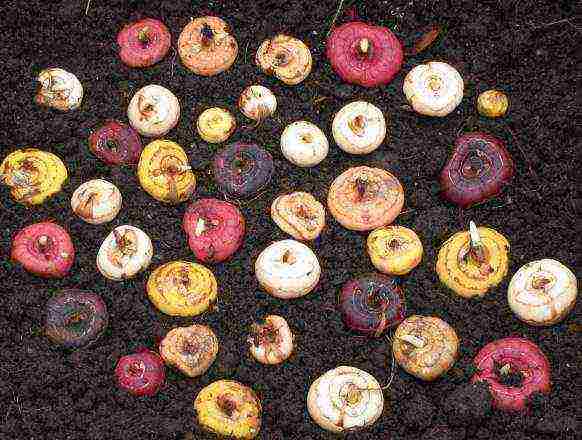
Before storing, gently remove soil residues from the bulbs with your hands.
- Cut off most of the stem, leaving a "stump" a couple of centimeters away from the stem.
- Set the bulbs in a warm, dry place and let them dry completely for 10-14 days.
- You can store tubers in a cardboard box or paper bags in the refrigerator. This can also be done in the cellar, but provided that the temperature is maintained in it no higher than 3-5 degrees.
Finally, I will tell you a little trick that many growers resort to for better storage and protection from drying out of the bulbs. Such a manipulation will not take much of your time, but it will help the bulbs to hold out until the next planting.
To do this, you just need to dip the tubers in paraffin, melted to 35 degrees, and immediately immerse them in cold water. You will then remove the formed thin film just before planting.

You can plant flowers no less beautiful than in the photo.
Outcome
Seating and caring for your gladioli can be a lot of fun. And what can we say about the delight caused by flowering plants that so nicely decorate the balcony?
If any nuances on the topic remain unclear to you, I will gladly tell you more about them in the comments below. And you can also watch the video in this article, which contains a lot more information useful for gardeners.
September 16, 2016
If you want to express gratitude, add clarification or objection, ask the author something - add a comment or say thank you!

